Sat 14 Jan 2012
TV Review: THE FIRM (2012) [and] THE FUTURE OF TELEVISION, by Michael Shonk.
Posted by Steve under Reviews , TV mysteries[18] Comments
[and] THE FUTURE OF TELEVISION
by Michael Shonk
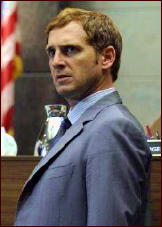
THE FIRM. NBC, 08 January 2012. Two-hour pilot for TV series to air Thursday at 10pm (Eastern) beginning 12 January 2012. Based on the John Grisham novel. Cast: Josh Lucas as Mitch McDeere, Molly Parker as Abby McDeere. Created for TV by Lukas Reiter. Written by Lukas Reiter. Directed by David Straiton. Executive Produced by John Grisham, Lukas Reiter, John Morayniss, Noreen Halpern and Michael Rosenberg, Co-Executive Produced by Helen Shaver and Peter Noah.
It is 2012, ten years after the events of the film and novel.
We open with our hero, Mitch being chased. He is running towards the National Mall and the Lincoln Memorial. It is daytime. There is a crowd, yet no uniform security in sight. Our hero runs into a passing tour guide. They fall to the ground. Still no uniform security or police. We notice the large men in suits that are after Mitch. He runs and “They†chase. He runs through the reflecting pool.
I am bored. Hey, endless number of evil henchmen, some advice. Don’t bother trying to catch him when he is in an open space with many witnesses. Follow him until he is stupid enough to go to a place where there is limited ways of escape.
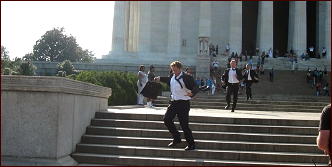
Extras, I know you are playing background, but this is 2012, don’t just ignore people running. No crowd today would let a well-dressed man run across the National Mall reflecting pool without having their cell phone cameras out. This entire chase and the faces of all would have gone viral on YouTube within an hour.
And where are the uniforms? This is post 9/11 in the middle of one of the heaviest trafficked parts of Washington D.C. and this chase, with a person run over, attracts no uniformed cops or security?
Back to the chase, Mitch thinks he has lost “Them.†He uses a pay phone to call his wife’s cell phone and warn her. A pay phone? Do those still exist? I know he does not use his cell phone because “They†can trace where he is through the cell phone. (I watch Person of Interest.) But our hero and wife have a plan, a plan that did not consider disposable untraceable cell phones. (Have they never seen an episode of Burn Notice?)
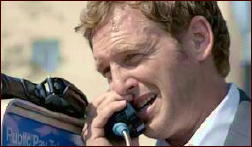
Next he goes to talk to the one person who knows the truth. Where does Mitch pick as a safe place to meet? In a high-rise hotel room with only two exits, the apartment door and the window leading to the patio several floors above the ground. (Get him now henchmen, get him now.)
The “Person Who Knows the Truth†refuses to share what he knows because “They†will kill him and he doesn’t want to die. Someone knocks on the door. So the “Person Who Knows the Truth†commits suicide by jumping off the room’s patio.
I understand the scene is meant to introduce the characters and action, but flip the settings. Have Mitch running in the hotel hallways and stairways, “They†chase. He escapes. Call wife on disposable cell phone. He meets the “Person Who Knows the Truth†in the National Mall. Terrified, the “Person Who Knows the Truth†is spooked. He runs and is hit and killed by a car. Mindless TV action can be entertaining without insulting your intelligence.
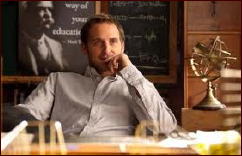
The show has been on for less than five minutes. At this point, I had to make a serious choice… continue and waste two hours of my life I’d never get back or watch something else. I went to my Amazon Video Library and watched They Call It Murder (1971).
This got me to thinking about how the TV show has moved beyond the TV. You don’t need a TV to watch The Firm pilot movie or the weekly series. Visit the official website at http://www.nbc.com/the-firm/.
At any point in the day you can watch a DVD featuring the first PI to appear on network TV (Martin Kane, Private Eye; NBC, 1949), or you can watch on your favorite device that streams or downloads video the very latest TV network PI (The Finder; Fox 2012).
Today we have countless choices on countless platforms all available for us on demand and most are mobile. Any second we feel bored, virtually anywhere, we can pull out our favorite handheld device and watch a TV show.
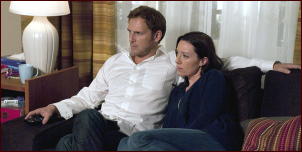
Will this change how television stories are told? Can you tell a story that visually works as well on a tablet as on a big screen TV? Will viewers care?
Will we watch different types of TV shows on our tablet than at home? Will we continue to sit in front of the TV screen and mindlessly watch whatever is on or will we choose the television show as well as when we mindlessly watch it on our preferred device?
So what began as a review of a badly written TV thriller ends with questions about how will we watch television in the future. Maybe if I had been more patient I would have found The Firm an entertaining thriller.
Who cares, I was bored and had better things to do. With more choices and easier access we have a better chance to find the exact fit for our leisure time needs of the moment. Television will no longer be for the mass audience but instead for each individual viewer. How will television deal with that?
January 15th, 2012 at 12:23 am
I’ve read articles about how it is possible to watch TV or movies on a hand held electronic gadget but I would never want to because of the small size of the screen. Evidently there is an audience that does want to do this but it seems a poor way to watch a film.
I’ve been more and more aware of Sturgeon’s Law lately, mainly that 90% of everything is crap. I keep trying to watch, read, and listen, to the less than 10% that is not garbage. Using electronic tablets, e-readers, etc just makes it harder for me to enjoy my favorite books, movies, music. More convenient yes, but I’ll stick to hardcopy books, my 46 inch TV, and cds.
Next, I’ll be joining Thoreau and moving out to Walden Pond.
January 15th, 2012 at 1:07 am
Walker, I remember watching TV on a 13 inch black and white TV. Today’s iPads and other tablets are not that much smaller. In fact I have a 27 inch computer monitor which gives me a larger look at graphic novels than the print versions.
I don’t have a smart phone, nor even a dumb cell phone, and I have no idea how anyone can used those phones to read or watch TV.
The DVD business that used to supply nearly half of the studios profits from the theatrical movies is falling more and more every year as more people turn to Netflix and Amazon Video for streaming TV and movies. I like to own my shows, but I prefer downloading to iTunes or Amazon over DVDs.
But even with all these choices there still is the family room and the 46 inch TV. Most people are going to want both, home and mobile television.
January 15th, 2012 at 1:38 pm
We’ve come a long way since I was small and our family used to go up to my great-grandfather’s house to watch mostly snow on his brand new TV set. When we finally got our own, we had the choice of watching one channel or nothing. We watched the one channel, including shows like Industry on Parade and What in the World as if they were the seventh and eighth marvels of the world, and they were.
Check out http://www.imdb.com/title/tt0045453/ for more information on the latter.
Now we can watch anything we want at almost any time we want, with no censorship if we wish, with or without commercials at our choosing, on any size device we want, but there’s no way in the world I’m going back to 13 inch monitors or smaller. Been there, done that. Watching TV on your cellphone? Not me, either.
But Michael, you, I and Walker are not typical TV viewers, and if people want to watch TV on their phones, I’ll be the last one to stand in their way. If ever DVDs become obsolete, though, I’ll probably go back to reading books. On paper. Technology is fine, but for me, I’ve gone about as far as I’m going to go.
January 15th, 2012 at 2:20 pm
I’m with Steve as far as new technology. I’m holding the line with regular dvds and no Blu-ray; hardcopy books and no E-Books, regular telephone and no smart phones.
One of the problems with all these gadgets is that they keep changing and not just every few years, but some every few months. Or at least it seems to me.
I remember being overjoyed when the first Beta video recorders came out in the late 1970’s. Then around 1990 I had to switch to VHS despite Beta being the better product. Then around 2002 or so, I had to switch again to dvd, despite having hundreds of video tapes. Now not only blu-ray comes but the possible end of the dvd format is on the horizon because of being able to download and stream videos.
So I’m boarding up the doors and preparing for the final invasion of the electronic age. I figure I have enough books, dvds, and cds, to last me for the duration.
January 15th, 2012 at 3:53 pm
Well, Walker, this constant change of information-keeping formats is a real danger for the whole culture, and even technological information, as in some years ahead ,there will be no machines to play older formats, and it is nigh impossible to change it all in time.
Books and real photos will be ,paper quality permitting, the only media to keep for a longer period.
The Doc
January 15th, 2012 at 4:06 pm
My major interest here is content. The changes between print and e-books and between DVDs and streaming does not change content just the container.
But the disappearance of the mass audience from network television will change content. The number of viewers it takes to make a hit show has fallen, no more cancelled TV shows with “only 30 million” watching.
In 1975 I attended a talk by Gene Roddenberry. He saw TV shows becoming like Book of the Month clubs, each viewer picking what programs to watch and pay for.
Today we have the season pass where you can buy a show and each new episode automatically downloads to your device even your TV (with Apple TV). Season passes from shows beyond our borders offer us programs we never would have heard of before.
I am not looking at what I will lose, an out of date container. I am looking at the increase in content. TV that is made for people who are not 18-49 years old. TV for people with special interests.
Imagine no more stuck with what the networks give you. You have much of the past of television available. Instead of a John Grisham thriller from 2012, I (alone on this planet at that moment) watched a 1971 mystery based on Erle Stanley Garner’s character DA Doug Selby.
January 15th, 2012 at 5:48 pm
Michael said:
“My major interest here is content. The changes between print and e-books and between DVDs and streaming does not change content just the container.”
Yes, this is very well put. I knew we’d gone off in a different direction, so thanks for getting us back on track. Like you, whenever I’m watching an old movie on a bootleg DVD, or reading a pulp magazine or in fact any book written before the year 2000, I often have the feeling that I may be the only one doing so at that particular time.
It’s a great sense of power — that I can read or watch whatever I want whenever I want. On the other hand, if everyone’s an audience of size one, how can a producer of mass entertainment justify the costs of creating something new?
Network and cable TV can’t go away. Who’d pay the bills if they did? Mass market publishers can’t go away, either hardcover or paperback. POD and Kindle-only books are fine as secondary markets, especially for authors who want to keep their old books in print, but the vast majority of new books produced solely for these backup markets can’t mean that they’re written for anything more than a hobby.
Will the future and the new containers that will come along with it result in an increase in the amount of content? In one way, of course. Michael, when you gave up on the 2012 production of THE FIRM, what did you do? Went back to a TV movie made in 1971. That’s an option you had that you wouldn’t have had 5 or 10 years ago.
On the other hand it doesn’t seem to bode well for people who want to create something new but have to do it for smaller and smaller audiences.
Just thinking out loud, that’s all. No answers. Not yet, at least.
January 15th, 2012 at 4:19 pm
Doc, photos on paper fade, paper ages. Recently my sister took our old family photos, most faded, some to the point where the people in the picture were disappearing and digitally restored the photos to the original look.
Again, the content will survive since the major business reason for changing the format is to get you to buy the same dang show again and again.
January 16th, 2012 at 12:01 pm
I recently stunned myself by reading George RR Martin’s A Dance with Dragons — a 1,000 or so page hardcover book — on my iPhone, making it like 20,000 e-pages. I could actually walk the streets of NY City reading at night because the pages were lighted, and I didn’t have to lug around a heavy book. I missed the first three seasons of Friday Night Lights and Terminator The Sarah Conner Chronicles while they were on broadcast TV and discovered them later through Netflix streaming; I now consider them among my favorite shows of all time. I rarely if ever watch an episode of any TV show, usually DVR-ing them instead (sports excepted). It’s a whole new world. The last TV shows I HAD to watch live were Lost and Battlestar Galactica, and I couldn’t wait to come to work the next day to talk about them. That’s the thing that people will miss the most — if everyone is watching the same shows at different times, whom are we going to share the experience with? I was so bowled over by TSCC, but by the time I found it the show was no longer even on the air. The Internet, with live blogging and chatting and fan groups and so on, is, in some ways, helping to actually PROLONG the experience of live TV viewing, which to me is a great thing, because the more we share and live as a community, the better we all are. Of course, if TV writers and producers make more shows like Lost and BSG and fewer like The Firm, maybe they can help us address the problem.
January 16th, 2012 at 1:33 pm
David reminded me of the new function of the TV critic, the recap. Today, several websites that cover television have critics recap what happened last night on certain shows such as FRINGE and AMERICAN IDOL.
People used to have to actually watch shows to have something to talk about at the office. Now there are places that serve as cliff notes.
As reality gets bigger, as local and world news blends into one, the audience of entertainment is shrinking. More people watched CSI at the time than LOST. Few, in comparison to the major four networks shows, watched BATTLESTAR GALACTICA.
But television needs to excite us now. It is becoming more important to be some people’s favorite show than a show watched by more people looking to kill an hour.
It has not happened yet. We still lose shows every year that sparks a passion in a few. This year its COMMUNITY and COUGAR TOWN some viewers are fighting for.
Book fans have seen major published writers skip the publisher and reach for the reader directly through the e-book. There are an increasing number of major talent taking to the web series. Hulu and Netflix are or will be offering original programs and series from other countries never shown here before.
Cable networks have occasionally beaten the big four networks shows in ratings. Are ABC, CBS, Fox, and CBS dinosaurs? No, but they will be different in the future.
January 17th, 2012 at 4:40 pm
As a Chicagoan born in AD 1950, television has always been part of my life.
There were already four stations in town when I was born (only New York and Los Angeles had more; most other cities had but one if any). A few years earlier, my parents courted by the light of wrestling, roller derby, and variety shows both local and national, plus the very occasional Poverty Row movie that had slipped into public domain.
As a kid I knew nothing of this; all I was aware of was a little box in the living room where I could see stories and variety and sports and even news (for 15 whole minutes a night!)every day, and how great was that?
Black & White? So were photographs and newspapers; also most of the movies we (very occasionally) went out to see. Color was for Life magazine and its kind, and for a few movies (that’s what made them special).
And when The Folks would tell us that there was a time when there was no TV. we rotten kids would scoff.
What a difference six decades (give or take) make.
Currently, I have one of the smaller 16×9 TVs available. I watch the new and the old, and sometimes the very old, and even on occasion the ancient. Lately I’ve been looking at newly restored DVD presentations of B movies from PRC, Monogram, Republic, and Lippert. As I’m watching, two related thoughts arise in my mind:
– (1) These creaky oldies once were what people paid their way into theaters to see.
And in depression or war times, people were glad of the entertainment, no matter how inexpensive it was.
– (2) These selfsame creaky oldies were among the first film fare made available to TV, while the Big Studios were trying to ignore the upstart medium.
As it turned out, the B guys were able to transition to TV without dropping a stitch, and they established a beachhead that the majors ultimately took advantage of.
Now we are bombarded daily with how each new advance will soon become obsolete by end of business next Friday. Just the thing to hear while you’re trying to put together the necessary mazuma to upgrade your current (obsolete) system to a newer (soon-to-be obsolete) system.
Depressing? Definitely.
But there’s also this.
People are still reading books.
Newspapers, too.
And paying their way into theaters to see movies on the one screen guaranteed to be larger than the one they’ve got at home.
It might be diminishing, but I believe it will never totally disappear.
Not while there still old coots like me, who grew up with Motorola and Muntz, who went out to Essaness and Balaban & Katz, whor bought 78s, 45s and LPs …
… those of us with a sense of history.
So I’ll just go home tonight, and if nothing new appeals to me, I can just slip a little silvery disc into a slot and watch anything that was recorded (and saved) during the last century.
And (if I am patient enough) I can try to tell those younger than I that the old stuff I’m collecting is every bit as worthwhile as anything they’re looking at today.
“Hey Kids! Here’s something for you to watch!
It’s in black and white!
It was made before you were born!
Everybody in it is dead!
So how about it?”
Hey … someone might go along …
January 18th, 2012 at 1:13 pm
Mike, as always I enjoy your trips down memory lane (a phrase that dates me).
My mother’s family was one of the first in Pittsburg Kansas to get a TV. It ruined many of her dates as once the boy saw the TV he’d want to stay and watch it. Then there was one far away channel.
By the time I was born in 1954, the small college town had two local stations, one for CBS, the other for NBC and ABC. When I find a show from the 50s and 60s I don’t remember seeing, it is usually because it never aired in my area.
My Dad was into the latest gadget and shiny things. In the 60s it was Hi-Fi Stereo. Music abandoned the 78 for the 45 single and the 33 album. Much of my grandparents’ music would not play on my record player. Not too much different than today.
Color TV hit. The black and white shows faded away, not only as original but in reruns. Colorization rose only to be killed off by a growing appreciation of b&w as a style. Today the front runner for Oscar’s Best Picture is a black and white silent movie. Hey, we loved our b&w, but we never would watch silent movies. Today people have a renewed interest in it.
Today we can own and watch as often as we want the first silent movie, the A and B and Z films of our past, TV from the early days to today, and more.
Today we can see how content has changed. We can study how acting, directing, and writing styles have changed. From silent movies where you told the story visually to the early stagey sound movies with action tied to where the sound equipment was. We can watch early Rene Clair and others films as they liberated the camera and give us movies instead of filmed stage plays.
When TV arrived and gave radio shows pictures, movie content changed, movies got Technicolor and stories got bigger. And theaters gave people their first exposure (sorry) to air conditioning.
Changes from advertisers producing shows to networks changed content and made many a TV series life shorter. Color TV, population shifts from Rural to City, the young Baby Boomers becoming the mass audience, all changed TV and the shows we watch. Good-bye BEVERLY HILLBILLIES and Westerns. Hello DICK VAN DYKE SHOW and hour long Crime shows.
Today the mass audience is fading away. In the 1980s a 22 share of the audience got you cancelled, today a 10 share of the audience gets you called a hit.
Where are the viewers going? We still are watching but now the choices for the viewer is beyond the two or three choices we grew up with. We can carry something that fits in our pocket and can entertain us with books, magazines, newspapers, movies, old time radio, games, television, etc. We can watch what we saw in our past. We can watch programs from all over the world. And we can do it anywhere and anytime.
For TV viewer, this has to be an exciting time. Unlimited choice.
For the TV creative world, this is an exciting time. Personal stories with limited appeal will be made. Writers not bound by Network rules or commercial breaks. Directors free to try things beyond the current standards of mass approval.
For the TV and movie businessman, this is a time of nightmares. More risks and less potential for returns.
I like living in a time where “what’s on tonight” has more than the three choices we had in the past.
January 20th, 2012 at 7:29 pm
According to Deadline.com, THE FIRM finished eighth in last night (1/19/12) time slot in the advertisers’ favorite rating number (18-49).
The Thursday 10pm (Eastern) finish was as follows:
1. MTV – JERSEY SHORE -9 share
2. CBS – THE MENTALIST – 8 share
3. ABC – PRIVATE PRACTICE – 5 share
4. TNT – NBA BASKETBALL – 5 share
5. TBS – THE BIG BANG THEORY Rerun – 4 share
6. UNIVISION – ROSA DE GUADALUPE – 3 share
7. A&E – BEYOND SCARED STRAIGHT – 3 share
8. NBC – THE FIRM – 2 share
For those looking for Fox, the network lets local stations program this time period.
January 20th, 2012 at 7:45 pm
Yipes! I think this says it all, doesn’t it?
Who’s in charge at NBC? Anybody?
January 20th, 2012 at 9:25 pm
The problems at NBC will take years or a major hit series to solve. The new guy in charge is Robert Greenblatt who was behind much of the success of Showtime network. Many think he is NBC’s best chance to recover from over a decade of bad programmer decisions.
But did you ever think you live to see MTV beat CBS in the ratings?
January 20th, 2012 at 10:18 pm
Given the age group, the answer is still No.
February 8th, 2012 at 1:38 pm
Back to the TV review… You gave up too early. The chase in 2012 was poorly done, but once we flashed back to the past I enjoyed myself. A few stupid things (the mob), but likable characters and interesting plot lines. Not cerebral, but fun none the less. Enough going on that I didn’t have time to ponder the things that didn’t work. I like the defense attorney with a conscience angle.
February 9th, 2012 at 1:39 am
That is always a possibility. You may have noticed I reviewed THEY CALL IT MURDER, the TV movie I watched instead of THE FIRM. While that movie had its problems, it never was as stupid as the opening of this TV movie.
Fun is not hard to find anymore. What is hard to find is something that can make you happy you spent your time watching it.
I am glad it worked for you and don’t forget, THE FIRM has moved to Saturday.